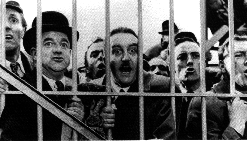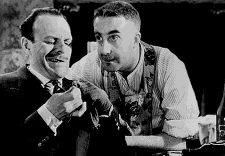Us vs. Them
| It is the 1950's in Britain, and the nation is undergoing social and economic changes after the long depression of World War Two. Stanley Windrush (Ian Carmichael), newly-graduated from Oxford, and most decidedly 'old money', decides to dabble in industry. Despite the absolute disapproval of his aunt Dolly (Margaret Rutherford), who is appalled that a gentleman should actually have to toil for a wage, he goes looking to various |  |
||
 Binding arbitration:Management (Terry-Thomas) and the union (Peter Sellers) hatch a plan... |
companies for an
executive position. The problem is, though well-meaning
and charming, Stanley is a useless twit. He infuriates
his interviewers and causes chaos when shown around the
factory floor wherever he goes. Stanley has become increasingly desperate when his uncle Bertram Tracepurcel (Dennis Price) offers him a job at his armaments factory, Missiles Ltd. The catch is that Stanley must start at the bottom. Bertram also advises him not to mention the fact they are related, 'in the interests of industrial relations'. |
||
| Stanley runs into problems on his first
day. He is put to work moving crates, but since he hasn't
done a days work in his life, he cannot operate the
forklift, and his accent is obviously not working class.
His work-mates have reason to be suspicious of him, since
they have discovered that the management has been
secretly observing their work practices in a 'time and
motion' study. The workers immediately tell the head of
the Works Committee Fred Kite (Peter Sellers),
who demands an instant meeting with the general manager
Major Hitchcock (Terry-Thomas), who
offers to fire him (since he knows that the real 'time
and motion inspector (John Le Mesurier)
hasn't begun working yet. Since it goes against all of
Kite's beliefs to let management fire a worker, he takes
Stanley under his wing. He has mistaken Windrush for a
well-meaning intellectual, and when Stanley moves in with
Kite and his family, he subjects Stanley to long-winded
discussions on socialism, the Soviet Union and Marxism.
Stanley had only moved in because he got a glimpse of
Fred's blonde bombshell daughter Cynthia (Liz
Fraser) John and Roy Boultings 1959 comedy is a brilliant satire on both the class struggle and industrial relations in Britain of the 1950s. As the movie shows, both were closely intertwined. Despite a complete absence of any natural talent, Stanley Windrush expects to become an executive, because he has been educated at Oxford and is a 'gentleman'. The management structure in industry mirrored the Army structure from the war, which of course mirrored society :- Major Hitchcock is the manager of the factory and had been an officer in the Army. Another factory owner, Sidney De Vere Cox (Richard Attenborough), had served with Stanley as officers. The workers were all non-comissioned soldiers. The workers are, to a man, bone-idle at Missiles Ltd. Any attempts to improve productivity or change work practices are stoutly resisted. And the heart of that resistance is Fred Kite. Fred, sporting a Hitler moustache, sees life as one long class struggle. He takes his inspiration from socialist struggles across the world, and is permanently on guard against any change to the status quo. Again, this reflected the wider situation in society. It was difficult for anyone to move out of their class (in an upward direction anyway), and since a worker would get paid anyway, why bother do a good job? The management doesn't really care too much about quality or efficiency either - since most of their business is dependent on the 'old boy network'. In the case of Missiles Ltd., Tracepurcel has employed Stanley for a reason. Knowing him to be useless, he figures that it will only a matter of time before he causes trouble. Tracepurcel has hatched a plan with De Vere Cox and needs a strike at his factory. The plan seems to be working when the union vote to 'send Stanley to Coventry' (i.e. ostracise him) for an accidental display of efficiency. Stanley had unwittingly quadrupled the productivity requirements of the workers by showing off his prowess with a forklift in front of the undercover 'time-and-motion' inspector. Kite calls a strike,which then escalates as other factories go on strike in sympathy. Soon, half the country is on strike. Since a nationwide strike would jeopardise Tracepurcel's plan, Stanley comes under pressure to quit, from both the management and the union. The depiction of the factory atmosphere is both hilarious and deadly accurate. On his first day, Stanley comes across 4 workers playing cards. These are not mere idlers - their role has been eliminated but the company cannot fire them (or the union will strike, so they are paid to come in every day and do nothing. The American author and journalist Bill Bryson, in his best-selling memoir of living in Britain, Notes from a Small Island, recalls his time working for a British newspaper during the mid-1980's. At one point, auditors discovered an extra 300 printers on the payroll of another newspaper (i.e. they weren't actually reporting for work at the newspaper). From the Fifties to the Seventies, British industry grew more strike-prone and less efficient. All was to change with the election of Margaret Thatcher in 1979, which, after traumatic confrontation, lead to the dismantling of union power in the UK. In contrast to the dodgy work practices depicted in the film, the production values in I'm alright Jack are of Rolls-Royce standard. The Boulting twins, having produced some fine dramatic pieces during the 1940s (most notably Brighton Rock), turned out a number of light comedies during the 1950's, most with the same cast. Indeed, I'm alright Jack is actually a sequel to Private's Progress (1956), which featured Terry-Thomas, Carmichael, Price and Attenborough playing the same characters (but in the Army). And in 1959, the Boultings also released Man in a Cocked Hat (a.k.a. Carlton-Browne of the F.O.), starring Terry-Thomas and Sellers. All of the performances are hugely enjoyable. The cast had spent the entire decade working almost as an ensemble (and very often for the Boultings) and it shows. If I have one regret, it is that we don't see enough of either Terry-Thomas or Sellers. Terry-Thomas played much the same role in many of his movies, but he was always enjoyable to watch. Sellers is a revelation. He completely inhabits the persona of a man for whom the union is his life, and is his only source of power. Speaking entirely in bureaucratic gobbledegook, and delightfully mispronouncing any word over three syllables, Seller's Fred Kite demonstrates not just his comic touches but also his undoubted acting ability. Sellers was on the verge of discovery in 1959. His third movie of that year, The Mouse That Roared, would attract the attention of film producer Blake Edwards, who decided that Seller's comic talent would be ideal for a David Niven star vehicle which he was planning. That movie was The Pink Panther and it was released in 1964, the same year as another Seller's film, Dr. Strangelove. |
|||
Directed by John Boulting. Produced by Roy Boulting.
| ****** Excellent - An outstanding
movie ***** V. Good - Very enjoyable or engrossing **** Good - Entertaining *** Mediocre - Nothing special ** Poor - A waste of time * Terrible - Complete rubbish |
***** |
| .Back to the top | . |
. |
© 1999 Stockholm Film Review. All Rights Reserved.